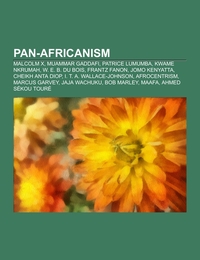-
Zusatztext
-
Source: Wikipedia. Pages: 162. Chapters: Malcolm X, Muammar Gaddafi, Patrice Lumumba, Kwame Nkrumah, W. E. B. Du Bois, Frantz Fanon, Jomo Kenyatta, Cheikh Anta Diop, I. T. A. Wallace-Johnson, Afrocentrism, Marcus Garvey, Jaja Wachuku, Bob Marley, Maafa, Ahmed Sékou Touré, Barthélemy Boganda, Julius Nyerere, Ali Mazrui, Fela Kuti, Stokely Carmichael, Martin Delany, Prince Hall, C. L. R. James, Paul Cuffee, Tukufu Zuberi, African empires, Owen 'Alik Shahadah, Molefi Asante, Négritude, Henry Sylvester-Williams, Edward Wilmot Blyden, Pan-African flag, United States of Africa, Henry Highland Garnet, Taj Anwar, Alexander Crummell, Kalonji Jama Changa, John Henrik Clarke, Amílcar Cabral, The Souls of Black Folk, Omali Yeshitela, Ra Un Nefer Amen, Henrietta Vinton Davis, Mighty Gabby, Pan-African colours, Henry McNeal Turner, Africana studies, Osiris Rising, Yosef Ben-Jochannan, Nkosi Sikelel' iAfrika, J. E. Casely Hayford, Walter Rodney, African dream, Chancellor Williams, Joe Appiah, Ayi Kwei Armah, Amy Ashwood Garvey, Théophile Obenga, Thomas Vincent Ramos, Runoko Rashidi, Nigel Gibson, M. K. Asante, John G. Jackson, Mahoma Mwakipunda Mwaungulu, Africanization, Ladipo Solanke, George Padmore, Dollarman, Jacques Depelchin, Asa Grant Hilliard III, Every Race Has a Flag but the Coon, Abdias do Nascimento, Amy Jacques Garvey, Toyin Agbetu, Herbert Bankole-Bright, African Century, Eliezer Cadet, Pan-African pellet compass, Tajudeen Abdul-Raheem, Na'im Akbar, Amon Bazira, Adama Samassékou, Tiemoko Garan Kouyaté, Pan-African Film Festival, Hakim Adi, Classical African civilization, David Comissiong, Nile Valley Civilizations, Carlos A Cooks, History of African Civilization, Eusi Kwayana, Jacob Carruthers, Pan-Africanist Student Movement of Azania. Excerpt: Muammar Muhammad al-Gaddafi (Arabic: ·); born 7 June 1942), commonly referred to as Colonel Gaddafi, has been the ruler of Libya since a military coup on 1 September 1969, when he overthrew King Idris and established the Libyan Arab Republic. His 42 years in power make him one of the longest-serving rulers in history. Gaddafi renamed the Libyan Arab Republic to Jamahiriya in 1977, based on his socialist and nationalist political philosophy published in The Green Book. In 1979, he relinquished the title of prime minister, and was thereafter called "The Brother Leader" or "The Guide" in Libya's Socialist Revolution. Throughout the 1970s and 1980s, Libya under Gaddafi was considered a pariah state by the West, which alleged oppression of internal dissidence, acts of state-sponsored terrorism, assassinations of expatriate opposition leaders, and crass nepotism exhibited in amassing a multi-billion dollar fortune for himself and his family. Gaddafi was a firm supporter of OAPEC and led a Pan-African campaign for a United States of Africa. After the 1986 Bombing of Libya and the 1993 imposition of United Nations sanctions, Gaddafi established closer economic and security relations with the west, cooperated with investigations into previous Libyan acts of state-sponsored terrorism and paid compensation, and ended his nuclear weapons program, resulting in the lifting of UN sanctions in 2003. In early February 2011, major political protests, inspired by recent protests in Tunisia, Egypt and other parts of the Arab world, broke out in Libya against Gaddafi's government and turned into a civil war. Gaddafi vowed to "die a martyr" if necessary in his fight against the rebels and external forces. On May 17.
-
Detailansicht
Pan-Africanism
Malcolm X, Muammar Gaddafi, Patrice Lumumba, Kwame Nkrumah, W.E.B.Du Bois, Frantz Fanon, Jomo Kenyatta, Cheikh Anta Diop, I.T.A.Wallace-Johnson, Afrocentrism, Marcus Garvey, Jaja Wachuku, Bob Marley, Maafa, Ahmed Sékou Touré
ISBN/EAN: 9781156559383
Umbreit-Nr.: 4292035
Sprache:
Englisch
Umfang: 162 S.
Format in cm: 1 x 24.6 x 18.9
Einband:
kartoniertes Buch
Erschienen am 21.12.2012
Auflage: 1/2012


